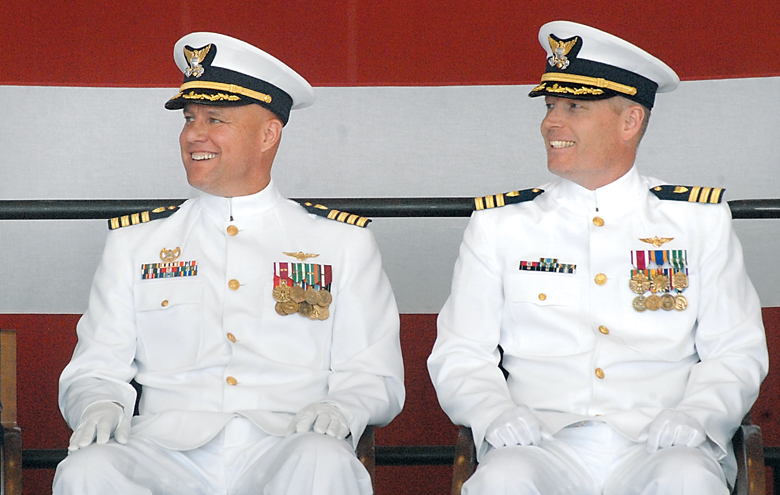PORT ANGELES — U.S. Coast Guard Cmdr. Mark E. Hiigel has assumed command of Coast Guard Air Station/Sector Field Office Port Angeles. He is the 41st commanding officer at the air station.
“I am happy to be here and look forward to serving the people of Port Angeles,” Hiigel said Friday.
“This is an area I love. I have been [stationed] here before — 1998 to about 2002 — and look to rekindle some old relationships and make some new ones.”
Hiigel, an Oregon native, reported to the air station following his most recent assignment as the response officer at Air Station North Bend, Ore., during the transition from Group North Bend to Sector North Bend.
In 2015, he fleeted up as the deputy commander of Sector North Bend.
As of Friday, Hiigel succeeds Capt. Andrew W. Eriks, who is being transferred to Washington, D.C., after successfully completing a two-year tour of duty in Port Angeles.
Eriks’ next assignment is at Coast Guard Headquarters, where he will serve as the program manager for the Coast Guard’s Financial Management Service Improvement Initiative, he said.
Change of command
“It is truly a dream to be stationed here in Port Angeles,” Hiigel said Friday morning during a change-of-command ceremony inside a hangar at the Coast Guard base on Ediz Hook.
The ceremony — taking place on a stage set up in front of a gigantic American flag — was attended by officials representing local, state and federal agencies, Coast Guard personnel and their families.
It was officiated by Rear Adm. Mark E. Butt, commander, Coast Guard 13th District, which includes Port Angeles.
During the ceremony, Butt presented Eriks with a Meritorious Service Medal and welcomed Hiigel to his new assignment.
“Cmdr. Higgel, congratulations,” Butt said.
“You are inheriting a tested and capable crew. Please remember that you are being entrusted with vast authority that accompanies tremendous responsibility.”
As the new commander, Hiigel will be responsible for overseeing operational responsibilities of the air station including conducting search and rescue and performing law enforcement, homeland security and resource protection activities in the Strait of Juan De Fuca and the northwestern coast of Washington, according to a news release.
The unit also provides logistical support to Sector Puget Sound units located on the Olympic and Quimper peninsulas and the northwest coast of Washington.
“I look forward to continuing service in the Pacific Northwest, to our federal, state, tribal and local agencies,” Hiigel said.
“This is a vast and remote area, and our alliances make us stronger. We appreciate the things they’ve completed in the past and we look forward to expanding upon our relationship in the future.”
Looking back
Having successfully completed his two-year tour, Eriks said he could not have done so without the dedicated support of those under his command.
“In order to be successful, we must be united as one unit — not half air station or half sector field office,” he said.
“I always made it a point to muster as one unit.”
Eriks said those under his command “performed with distinction . . . and significantly contributed to our overall success. During my tour, I am convinced we made a difference in the lives of others,” rescuing stranded hikers, kayakers and the crews of capsized vessels.
“The crew here at Port Angeles has done a wonderful job performing missions,” Butt said during the ceremony.
Search, rescue missions
Under Eriks’ command, the base conducted more than 400 search and rescue missions, resulting in 93 lives saved, Butt said.
“One of the principal reasons why Air Station and Sector Field Office Port Angeles have been set up for success is the leadership exemplified by Capt. Eriks,” Butt said.
Said Eriks: “This air station is truly special, as we have a diverse set of missions and the support we provide across Sector Puget Sound’s western area of responsibility is noteworthy. My crew performed with distinction, and it was an honor and privilege to serve as their commanding officer.”
Highlights of venture
Eriks also spoke about some of the highlights of his time in Port Angeles, including participation in the four-day Cascadia Rising exercise in June and dealing with waterborne, Greenpeace-led protesters in April 2015 during the arrival of the Polar Pioneer drilling rig.
Eriks joked that the one thing that kept him up at night were worries about the “sea gulls and geese” that make their homes around the station, as they can be a hazard to flight operations.
________
Features Editor Chris McDaniel can be reached at 360-452-2345, ext. 56650, or cmcdaniel@peninsuladailynews.com.
